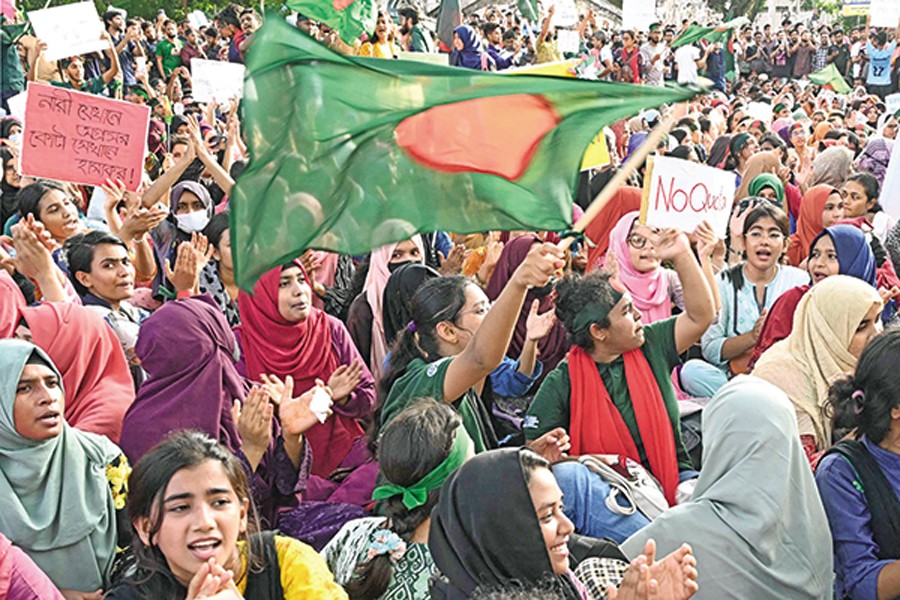
Published :
Updated :

"The only thing we learn from history is that we learn nothing from history." Whether it's the authorities or the general populace, governments or citizens, dictators or victims." German philosopher Hegel's quote often hits us with the harsh truth.
Reflecting on history, the 1997 IMF crisis in South Korea exemplified a unique form of patriotism. The 'Gold Gathering movement', where citizens donated gold jewellery, family heirlooms, and other valuables, raised over $2 billion to help repay the national debt—a remarkable initiative matched by the labourers' patience as they worked without pay.
Similarly, in Japan after World War II, many Japanese citizens voluntarily participated in labour to rebuild their communities by clearing debris, reconstructing homes, and restoring essential services.
This collective resilience and sense of duty, deeply rooted in Bangladesh's recent history, is a source of inspiration.
During the bloody revolution that toppled Sheikh Hasina's authoritarian regime, the general population and student leaders played remarkable roles.
In solidarity, remittances were halted, and professionals joined the non-cooperation movement. After the regime's fall, remittances resumed, students directed traffic in the absence of police, and residents protected their homes. The spirit of unity, akin to that seen in Japan and South Korea, was increasingly evident among the Bangladeshi people.
These heartfelt stories offer hope of freedom from the fear of repression. Yet, history reminds us of the millennial belief that 'All are the same.'
After the war, selfishness emerged, leading to the creation of the '6th division' of fake freedom fighters. This resulted in an abnormal increase in the official list, with investigations revealing that many certificate holders were actually born after the war. According to a national daily, around 2,000 such cases were identified.
Fast forward to 2024, and after the regime fell, similar patterns began to emerge. Complaints surfaced on social media about individuals falsely claiming to be 'Shomonnoyok' (coordinators) of the protest.
These impostors sought to exert power over locals, exploiting the situation for personal gain. Even political parties began to claim credit for the success of the protests.
This exploitation of a vulnerable moment mirrors the manipulation seen after the 1971 liberation. 41-year-old Sharmila Sathi, who owns a small tailor shop in Pallabi, recounts how she was forced to pay over 8 takas per month to the ruling league protection. "The whole of Mirpur had been suffering for so many years," she said. But did it change? Disappointed, Sharmila says, "For the first few days! But soon after, another group emerged. They came twice last week, asking for 200 takas each, claiming it was for maintenance and other expenses."
As the interim government steps into power, less than a month has passed, and the nation finds itself in a familiar state of uncertainty. The post-war era of 1971 and the post-movement era of 2024 share striking similarities.
According to Iraz Noor Chowdhury, a journalism student at DU, "Other eras experienced different yet similarly troubling levels of robbery, infrastructure damage, civilian unrest, and the absence of law and order in their initial days."
He also explains, "After the war, they didn't want to hand over their weapons to the government, creating prolonged chaos. Similarly, today, we see people taking to the streets for any reason they find. The protest for the cancellation of the HSC 2024 exam is an example of misguided demands."
As for the difference, he adds, "The unity displayed by the people in tackling these challenges is striking—many are contributing to help those affected by the floods." But even with this solidarity, one must ask: Do Gen Z and the protesters possess the trust and optimism needed to transform the nation truly?
Nourin Sultana Toma, also a journalism student who actively participated in the protests, emphasizes the urgent need to reform the constitution. She argues that the constitution of Bangladesh has been repeatedly altered to serve the interests of the ruling party, both during the years 1972-1975 and 2009-2018.
"Other periods taught us valuable lessons," she reflects, highlighting the importance of a constitution that reflects the people, not the whims of those in power.
Rahee Nayeb, a cartoonist and a student of the social science faculty of Dhaka University, notes, "While I struggle to trust the current political parties, I hope the interim government will create a political landscape that offers some hope for future elections."
The tendency for power manipulation, the possibility of the oppressed becoming the oppressor, has not yet disappeared. People are indeed trying to keep faith in the interim government, but it would be foolish to sit back and wait for the government to clean up the mess left by the previous regime.
Only moral solidarity might work for our people and country as well. Greed must be overthrown, and the nation must finally believe that this is truly our own country.


 For all latest news, follow The Financial Express Google News channel.
For all latest news, follow The Financial Express Google News channel.